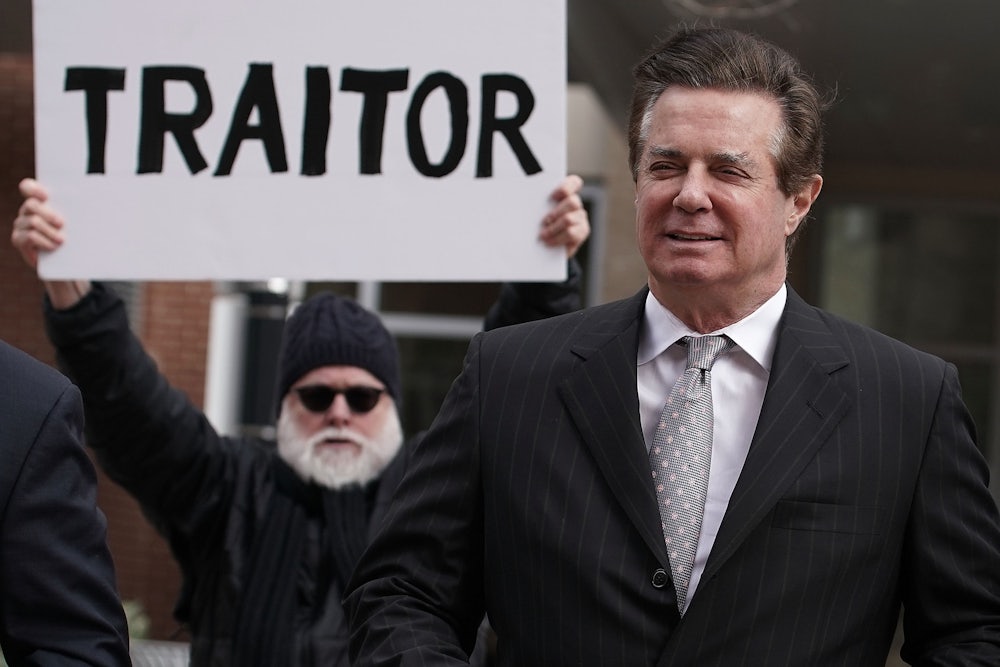On Wednesday, two decisions came down that both have serious implications for the criminal justice system in America. But the reactions to them couldn’t have been more different.
Opponents of overly harsh sentencing and wrongful convictions applauded Governor Gavin Newsom’s decision to end the death penalty in California, which will shut down the largest Death Row in the country. There promises to be comparatively little blowback from Newsom’s decision: Death sentencing has reached record lows due to changes in public sentiment and research showing severity of punishment has little deterrent effect on crime.
But the sentencing of Paul Manafort by a federal judge in the District of Columbia sparked outrage among critics of the Trump presidency. They noted that, in both the Wednesday sentence and one handed down last week by another federal judge, Manafort received less than the maximum prison time for felonies that included tax fraud, mortgage fraud, money laundering, conspiracy, and obstruction of justice. After all, they argued, poor defendants rarely get such leniency—and, in marked contrast with the Manafort case, they typically are handed far harsher sentences for offenses that pose no danger of corruption to our government.
Is it hypocritical to call for less severe sentences for “regular” criminals while decrying leniency for white-collar defendants? Those debates are now roiling the pundit world, but as a longtime student of disparities in judicial outcomes, I find the basis of the comparison deeply misleading. The juxtaposition of the Manafort and Newsom stories should prompt us, rather, to question anew the impulse to frame years in prison as the most appropriate response to our most pressing social problems.
There is no practical purpose in giving a 50-year sentence to a 69-year-old defendant like Manafort. And according to the research, the prospect of a 50-year sentence probably wouldn’t have even deterred Manafort if he thought he wouldn’t get caught. What is remarkable about Manafort’s conduct was how serious and repeated his tax and foreign conspiracy violations were. As the sentencing judge put it, “I’m sorry I got caught,” is “not an inspiring plea for leniency.” And that, indeed, is the bigger moral of Paul Manafort’s long criminal career: for many years, he was not caught.
Why? It’s not, as we now know in exhaustive detail, that Manafort was any sort of cunning criminal mastermind. No, he was able, like countless other offenders in the sphere of financial and corporate crime, to exploit enormous loopholes in a porous, under-resourced regime of regulatory capture and indifferent enforcement.
For many years, the justice system has allowed serious corporate corruption to go unpunished, banks to be prosecuted repeatedly for the same crimes, and corporations and executives to get deferred prosecutions and below-the-guideline sentencing. This system of pronounced judicial leniency has created a punishment model for many corporate offenders that I call “too big to jail”—and in recent years, matters have gotten worse. Even within this already skewed and top-heavy system, I have documented declining corporate penalties under the Trump administration. Ending “too big to jail,” however, doesn’t mean passing tougher sentences for white-collar crimes. After all, Congress has created plenty of tough new white-collar offenses since the 2001 Enron scandal—and, for the most part, these new tools have sat on the shelf untouched by prosecutors.
Instead of enacting more draconian sentences, we must invest in white-collar law enforcement the same way we invest in other measures to protect public safety. Consider this: the Internal Revenue Service has had its budget cut over the past decade to the point where audits have decreased by 42 percent and the number of tax fraud cases the agency brings has been cut by nearly 25 percent. Under such lax enforcement, tax fraud schemes—of the very sort repeatedly carried out by Paul Manafort—are able to thrive. And while better white-collar crime enforcement is a key, neglected foundation of public safety, the rationale for more sustained and concerted pursuit of white-collar criminals doesn’t end there. These offenses also pose much broader hazards to our well-being. They endanger the national economy—and conspiring with other countries endangers national security—on a far greater scale than the harms wrought by drug possession and street crimes.
The way out of the double standard we apply to punishment is to reject the notion that true justice inheres in strictly hewing to a one-size-fits-all model of criminal sentencing. To begin using law enforcement as a means of meaningful social reform, we need, rather, to consistently apply the same standards of enforcement to all types of crime: police far more, prosecute and punish far less, utilize evidence-based treatment, and ask that violators give back and make the community whole. Harsh sentences don’t deter crime, but changing the focus of our enforcement systems just might.
